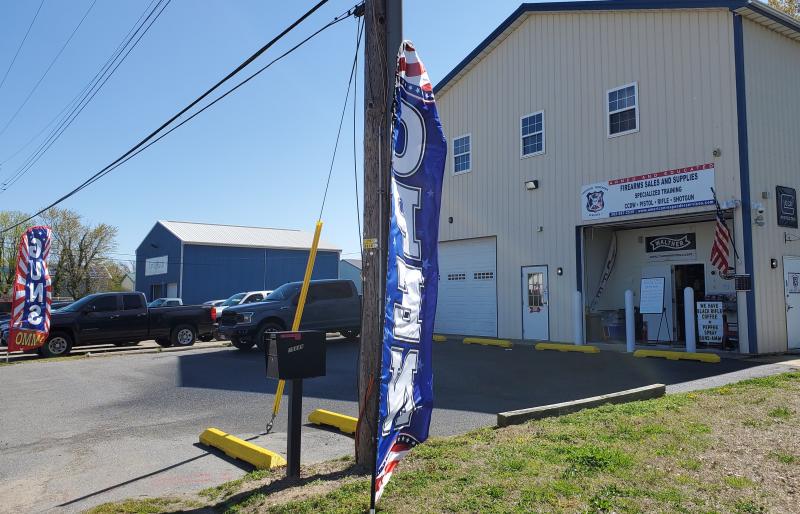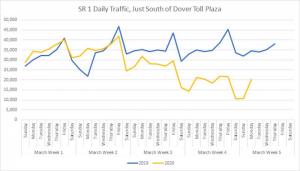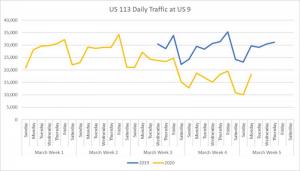Ron Hagan and Hank Rickards opened their gun shop, American Responder Services, in West Rehoboth in May 2018. Nearly two years in, Hagan said March was the busiest month they’ve ever had.
“I don’t know if it’s ever going to be topped,” said Hagan during an interview April 9. “There’s been a lot of first-time gun buyers because of all the uncertainty. People want to have the ability to protect themselves.”
Among the first actions taken by Gov. John Carney to slow the spread of COVID-19 was to shut down all nonessential business and activities in the state, starting March 24. Initially, the majority of gun shops were included in that order, because they fell under the definition of a sporting goods store. A few days later, after a significant outcry by advocates, Carney said gun shops are allowed to sell guns by appointment.
During the three days they were supposed to be closed, gun shops up and down the state forced the issue and stayed open, Hagan said. His store was open, but not in violation because it isn’t listed as a sporting goods store under the North American Industry Classification System, which was the list used by the state to determine essential from nonessential business.
Hagan couldn’t remember his store’s exact NAICS number, but he said they sell more than guns and fell under a different retail category.
Much like toilet paper and hand sanitizer, Hagan said, there’s a huge shortage of ammunition because people are hoarding that too. He said his business still has some in stock, but they’ve started limiting what’s sold to people who buy guns.
“It doesn’t do a customer any good if they buy a gun, but can’t also buy ammunition,” said Hagan, who explained there’s a shortage because manufacturers are having trouble importing components. “With the parts closed down, there’s no access. Ammunition prices have doubled in some cases.”
At the beginning of the COVID-19 crisis, during an interview about a house he’s trying to give away on Route 1, Hagan said the shop was beyond busy. Now, he said, it’s slowed down a bit, but things are still busy.
“That said, April looks like it’s going to be our second busiest month ever,” said Hagan.
Traffic, wastewater flows, energy usage down in March
Gun sales may be on the rise, but traffic, wastewater flows and energy usage across Sussex County are down since the middle of March.
Delaware Department of Transportation apparently anticipated a decrease in traffic, because on March 17, the department issued a notice asking that all traffic counts for traffic impact studies be postponed until the state of emergency is lifted. The notice said a good measure of when traffic counts can resume would be the reopening of public schools.
In an email April 8, C.R. McLeod, DelDOT spokesperson, said DelDOT has done select traffic monitoring of a few locations in each county since that notice went out. Overall, he said, traffic volumes across the state have decreased 40 to 50 percent over the past several weeks.
McLeod provided graphical representation of the two locations being monitored in Sussex – on Route 24, east of Millsboro, and on Route 113, at the intersection with Route 9. In both instances the line for March 2020 mirrors the line for March 2019, but the daily traffic is down.
It’s not in Sussex County, but McLeod also provided a graph of daily traffic flow at the Route 1 toll plaza immediately south Dover. It shows March traffic counts were up at the beginning of the month compared to last year, but around March 12, the 2020 counts dip below the 2019 counts and the gap between the two has been widening ever since.
Chip Guy, Sussex County spokesperson, said the flow at the county’s Wolfe Neck Regional Wastewater Facility, located off Wolfe Neck Road outside of Rehoboth, was down by about 6 million gallons in March. He said that represents about a 13 percent decrease in flow from March 2019 for the facility that serves the Route 1 corridor of the Cape Region.
Guy said flow has not decreased significantly at the county’s South Coastal Regional Wastewater Facility in Frankford.
Rehoboth Beach Public Works Director Kevin Williams said the city has seen a similar drop in water usage. Comparing March 2019 to March 2020, he said the city has pumped 17 percent less water out of the ground in Rehoboth and 13 percent less in Dewey Beach, which is on Rehoboth’s system.
As for energy use, Jeremy Tucker, Delaware Electric Cooperative spokesperson, said the company estimates energy use across their system has fallen by about 5 percent since the COVID-19 shutdown began.
Tucker said the cooperative provides service mainly to residential and agricultural accounts, so the restrictions on businesses have not translated into a significant drop in energy use.
Chris Flood has been working for the Cape Gazette since early 2014. He currently covers Rehoboth Beach and Henlopen Acres, but has also covered Dewey Beach and the state government. He covers environmental stories, business stories and random stories on subjects he finds interesting, and he also writes a column called Choppin’ Wood that runs every other week. He’s a graduate of the University of Maine and the Landing School of Boat Building & Design.
























































